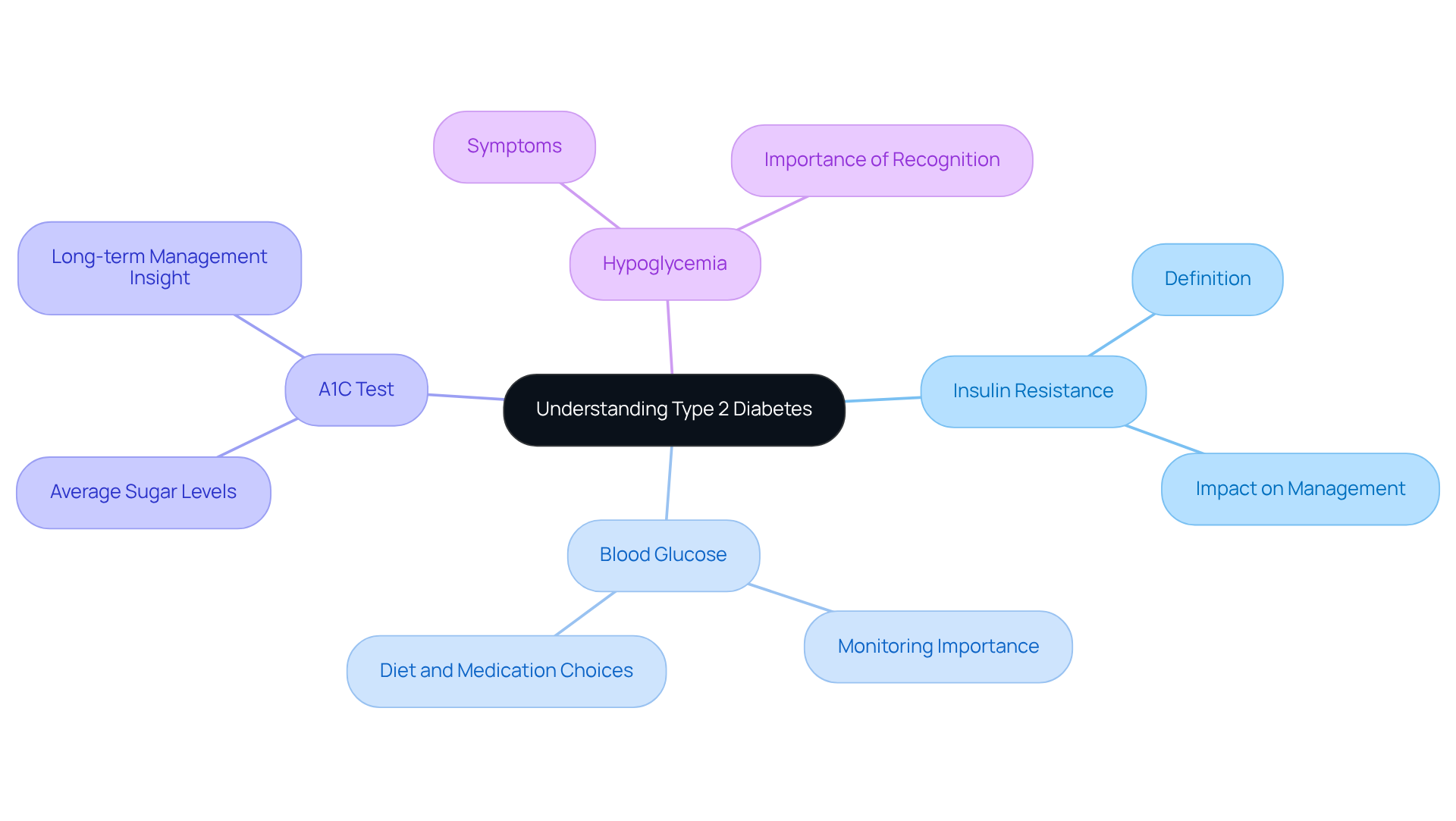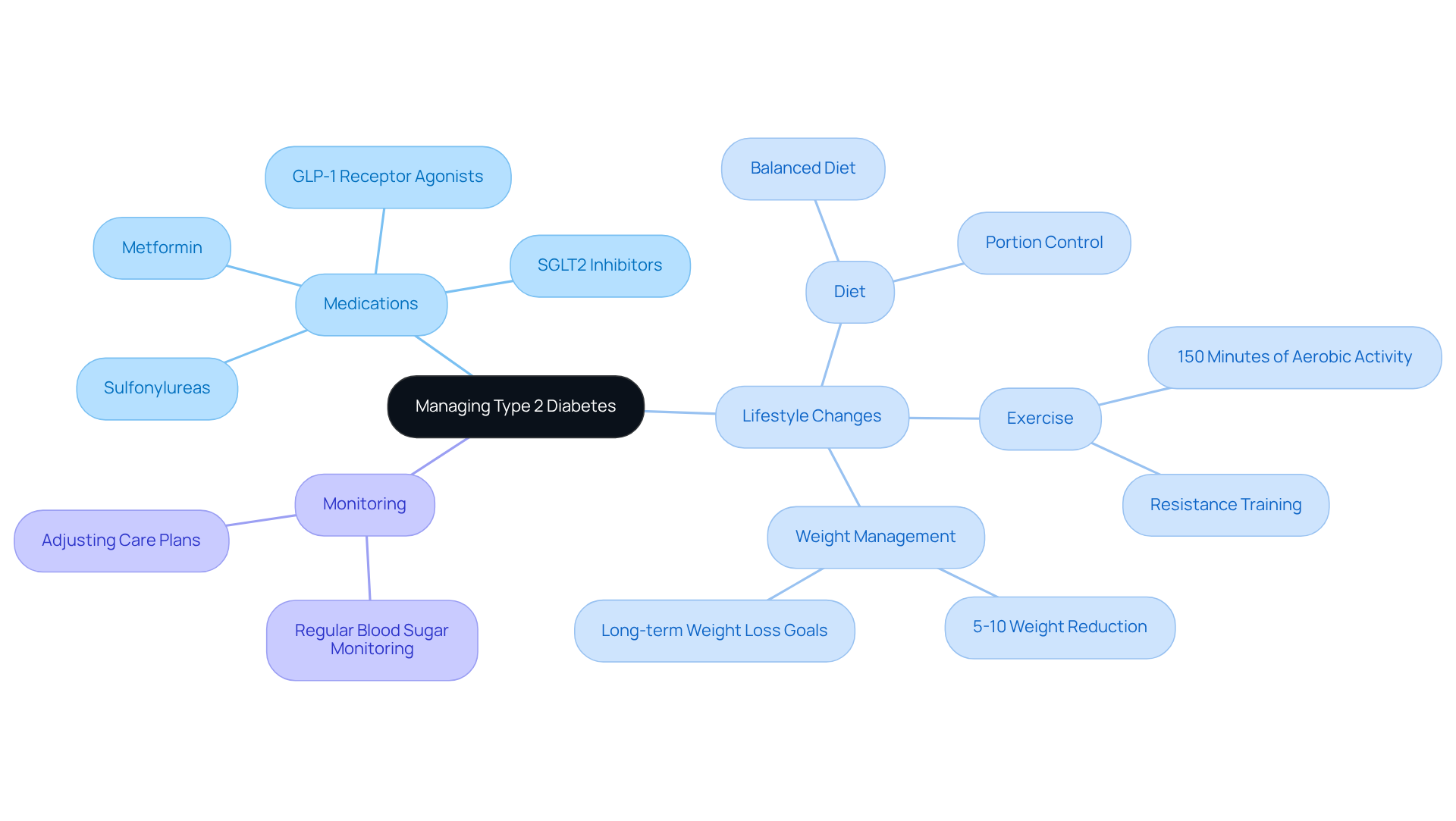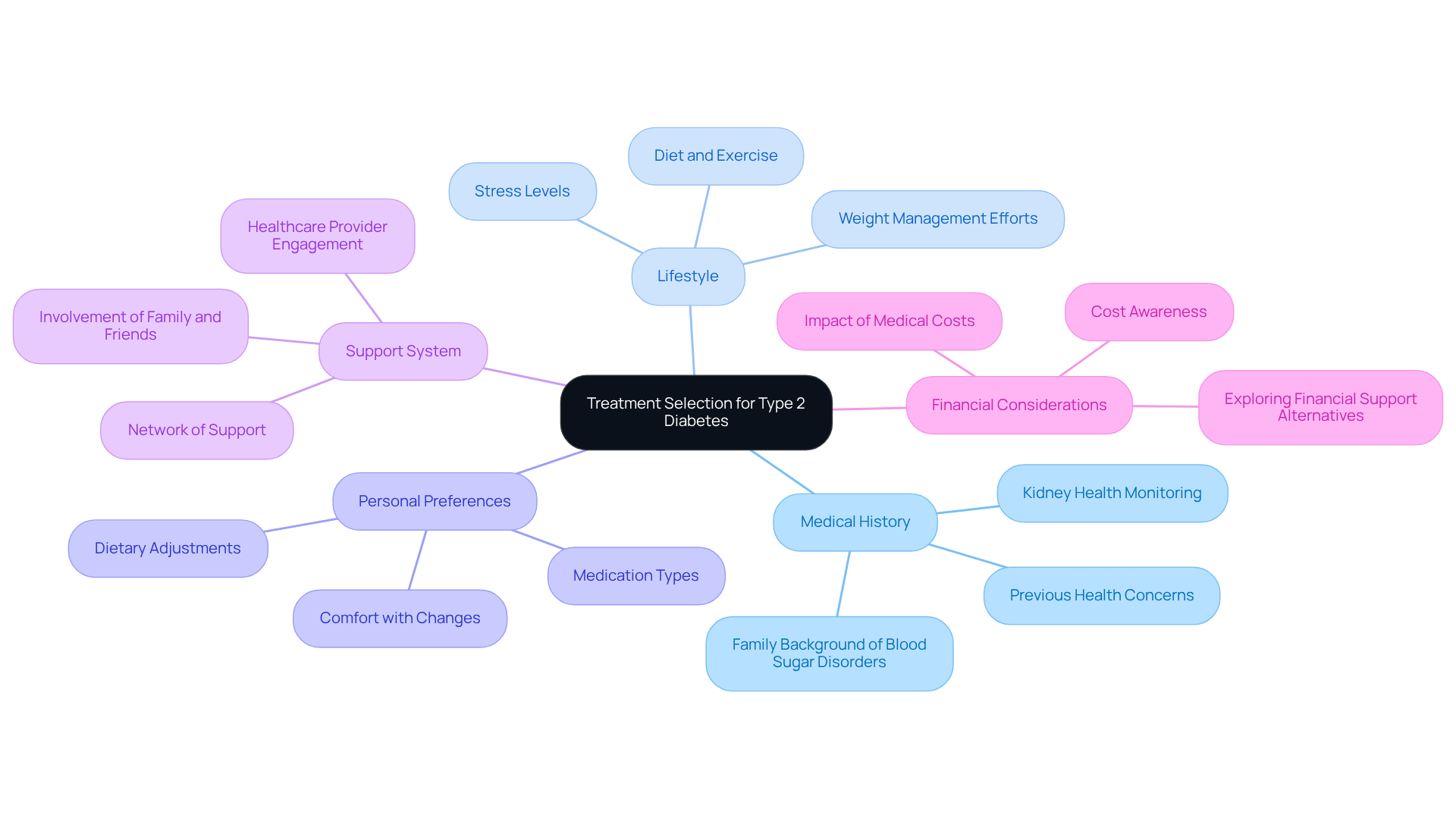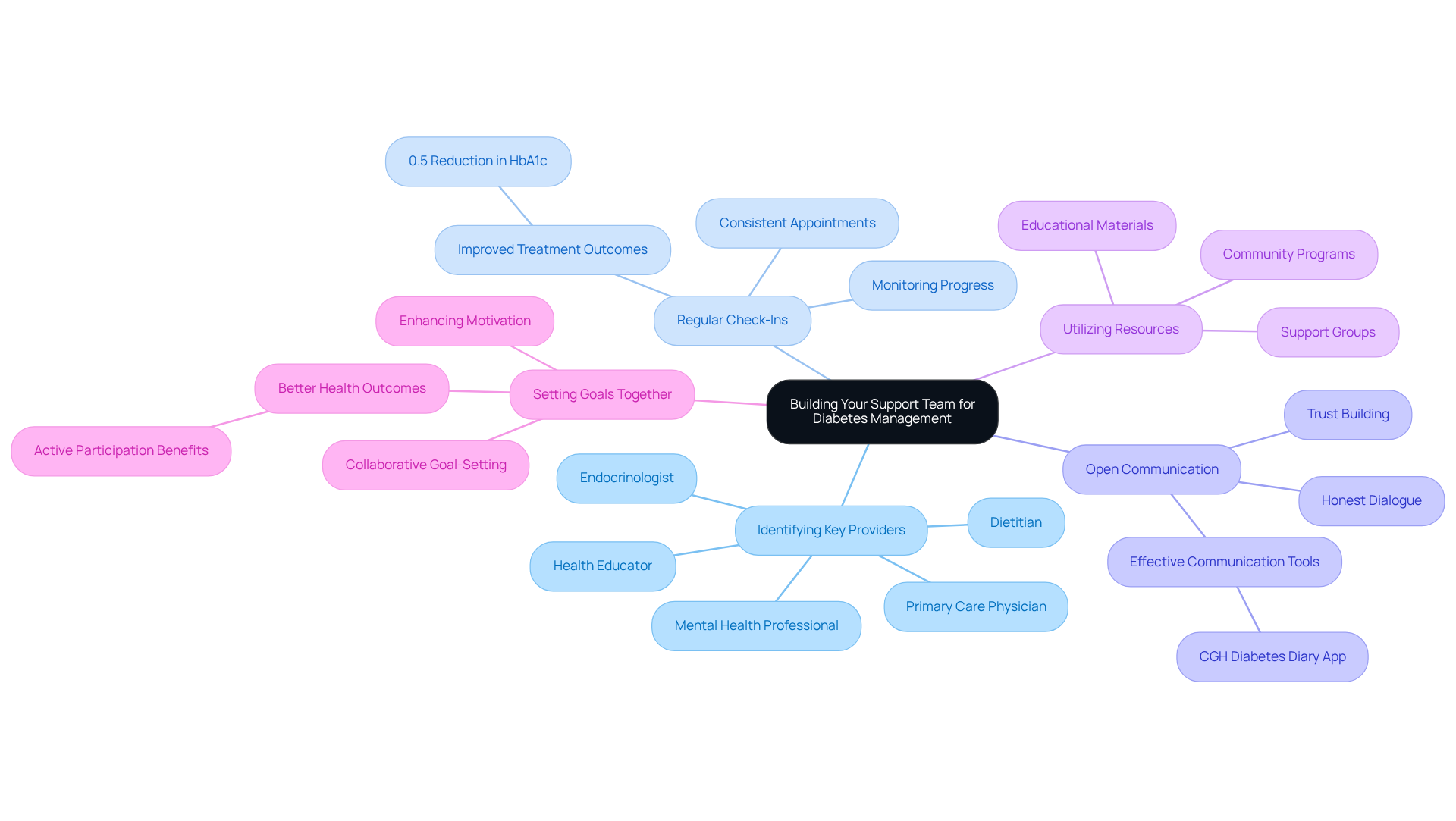Overview
Navigating medical treatment for Type 2 diabetes can feel overwhelming, but you are not alone in this journey. This article outlines four essential steps designed to empower you:
- Understanding key diabetes concepts
- Exploring treatment options
- Assessing your individual needs
- Collaborating with healthcare providers
Each step is carefully supported with detailed information on medications, lifestyle changes, and personal factors that can influence your treatment.
It's understandable to feel uncertain about where to start. By learning about your condition, you can make informed choices that align with your health goals. Exploring treatment options is crucial, as it allows you to find what works best for you. Remember, assessing your individual needs means considering your unique circumstances and preferences.
Collaboration with healthcare providers is vital. A supportive healthcare team can make all the difference in managing your condition effectively. Together, you can create a plan that feels right for you, ensuring that you have the support you need every step of the way.
We encourage you to reach out for help and share your experiences. Community support can be incredibly beneficial as you navigate this path. You're not alone in this journey; we are here to support you every step of the way.
Introduction
Navigating the complexities of Type 2 Diabetes can feel like an uphill battle. It's understandable to feel overwhelmed, especially when it comes to understanding treatment options and necessary lifestyle changes. This guide aims to illuminate the pathway through the intricacies of medical treatment for Type 2 Diabetes, empowering you with knowledge about:
- Medications
- Dietary adjustments
- The importance of a robust support system
Remember, you’re not alone in this journey. With so many choices and factors to consider, how can one effectively tailor a treatment plan that truly meets their unique needs? We are here to support you every step of the way.
Understand Type 2 Diabetes: Key Concepts and Terminology
Welcome to T2DSolutions, your new resource hub for Type 2 Diabetes education and support. Understanding Type 2 Diabetes is essential for effective management, and familiarizing yourself with key terms is crucial for communicating with your healthcare team and navigating the medical treatment for type 2 diabetes options.
- Insulin Resistance: This occurs when the body's cells fail to respond adequately to insulin, resulting in increased blood glucose levels. It's understandable to feel overwhelmed by this concept, but recognizing it is vital, as it directly impacts your diabetes management strategies.
- Blood Glucose: This refers to the concentration of sugar in the circulation, which must be monitored regularly to maintain optimal health. Monitoring your glucose levels aids in making informed choices regarding your diet and medication. Remember, you're not alone in this journey; many are navigating similar paths.
- A1C Test: This test evaluates your average sugar levels over the past 2-3 months, offering insight into your long-term glucose management. Regular A1C testing is essential for assessing how well your diabetes management plan is working, and we encourage you to discuss this with your healthcare provider.
- Hypoglycemia: This condition occurs when sugar levels decrease too low, resulting in symptoms such as dizziness, confusion, and fatigue. Recognizing the signs of hypoglycemia is crucial for timely intervention and maintaining overall health. It's important to know that support is available when you need it.
By understanding these key concepts, you will be better equipped to engage with your healthcare providers and effectively navigate your medical treatment for type 2 diabetes options. Explore T2DSolutions for more resources and support tailored to your needs. We are here to support you every step of the way.

Explore Treatment Options: Medications, Lifestyle Changes, and More
Effectively managing Type 2 Diabetes requires a multifaceted approach that includes medical treatment for type 2 diabetes along with significant lifestyle changes. It’s understandable to feel overwhelmed, but know that support is available.
Medications: The cornerstone of treatment is usually Metformin, recognized for its effectiveness in lowering sugar levels. Other medication options include:
- Sulfonylureas: These stimulate the pancreas to produce more insulin, helping your body manage sugar levels better.
- GLP-1 Receptor Agonists: These medications enhance insulin secretion and help reduce appetite, contributing to weight loss, which can be beneficial for your health.
- SGLT2 Inhibitors: These assist the kidneys in excreting excess glucose, further aiding in glucose regulation.
Lifestyle Changes: Implementing lifestyle modifications is vital for optimal diabetes management. Remember, small changes can lead to significant improvements:
- Diet: Emphasize a balanced diet that includes whole grains, a variety of fruits and vegetables, and lean proteins. This approach not only aids in sugar regulation but also serves as a valuable medical treatment for type 2 diabetes, enhancing overall health.
- Exercise: Engaging in at least 150 minutes of moderate aerobic activity weekly is recommended. This level of physical activity can significantly improve insulin sensitivity and assist in weight management, which is crucial for those with Type 2 Diabetes.
- Weight Management: Even a modest weight reduction of 5-10% can result in significant enhancements in sugar levels and overall health outcomes.
Monitoring: Regular monitoring of blood sugar levels is essential. This practice helps you understand your body's reaction to both medications and lifestyle changes, enabling timely adjustments to your care plan.
Integrating these strategies aligns with expert advice and reflects the latest information on blood sugar control. Real-life instances, such as patients successfully managing their condition with Metformin, highlight the importance of a comprehensive strategy that includes medical treatment for type 2 diabetes and lifestyle interventions. Remember, you’re not alone in this journey; we are here to support you every step of the way.

Assess Your Needs: Factors to Consider in Treatment Selection
When evaluating your medical treatment for type 2 diabetes, it's essential to consider several key factors that can significantly impact your journey.
-
Medical History: It's important to share any previous health concerns, medications, and your family's background of blood sugar disorders or related conditions. This information is vital as it can influence your treatment approach. For instance, did you know that this condition accounts for a significant percentage of new kidney failure cases? This highlights the need for careful monitoring of kidney health, especially if you have a relevant history.
-
Lifestyle: Take a moment to assess your daily habits, including your diet, physical activity, and stress levels. Research shows that lifestyle factors play a crucial role in managing blood sugar levels. In fact, 73.1% of adults with diabetes actively manage their weight to reduce disease risk. This demonstrates just how impactful lifestyle modifications can be on your health outcomes.
-
Personal Preferences: Reflect on your preferences regarding medication types, dietary adjustments, and exercise routines. Feeling comfortable with these changes is essential for sticking to your treatment plan. Engaging with healthcare professionals can help tailor a plan that aligns with your lifestyle and preferences, ensuring you feel supported every step of the way.
-
Support System: Identify your assistance network, including family, friends, and healthcare providers. Their involvement can significantly enhance your management efforts. A strong support system fosters resilience and encourages adherence to treatment plans, reminding you that you're not alone in this journey.
-
Financial Considerations: Be aware of the costs associated with medications and treatments. The average medical costs for individuals with diabetes are 2.6 times greater than those without it. Exploring financial support alternatives can reduce some of the challenges related to blood sugar control.
By considering these factors, you can work closely with your healthcare team to develop a personalized medical treatment for type 2 diabetes that effectively addresses your unique needs and circumstances. Remember, we are here to support you every step of the way.

Collaborate with Healthcare Providers: Building Your Support Team
Establishing a strong support team is vital for effective diabetes management. Here are some important steps to consider, along with how T2DSolutions can support you on this journey:
- Identifying Key Providers: It's essential to assemble a team that includes a primary care physician, endocrinologist, health educator, dietitian, and, if needed, a mental health professional. This diverse team can address various aspects of your health, ensuring comprehensive care. T2DSolutions offers resources to help you find qualified providers in your area.
- Regular Check-Ins: Scheduling consistent appointments is crucial to monitor your progress. It's understandable to feel overwhelmed, but studies show that regular check-ins can significantly improve treatment outcomes. Patients often experience better glycemic control and reduced complications. For instance, a well-organized diabetes management program demonstrated a 0.5% net reduction in HbA1c levels, highlighting the effectiveness of continuous support. T2DSolutions provides tools to help you track your appointments and progress.
- Open Communication: Maintaining honest dialogue about your challenges and successes with your healthcare team is important. This transparency fosters trust and enables personalized assistance. Effective communication strategies, such as using tools like the 'CGH Diabetes Diary' app for tracking glucose readings and food intake, can enhance this process. T2DSolutions also offers forums and discussion groups where you can share experiences and gain insights from others.
- Utilizing Resources: Leveraging educational materials, support groups, and community programs provided by your healthcare team is beneficial. Engaging with these resources can equip you with knowledge and foster a sense of community, which is essential for emotional encouragement. T2DSolutions acts as a hub for health education, offering various resources and links to nearby support groups.
- Setting Goals Together: Collaborating with your team to establish realistic and achievable health goals is key. This collective approach ensures that everyone is aligned in your health management journey, enhancing motivation and accountability. Research indicates that patients who actively participate in goal-setting with their healthcare providers are more likely to achieve better health outcomes. T2DSolutions can assist in goal-setting by providing resources and tracking tools to monitor your progress.
By following these steps and utilizing the resources available through T2DSolutions, you can build a strong support system that not only aids in managing Type 2 diabetes but also includes medical treatment for type 2 diabetes to enhance your overall quality of life. Remember, you're not alone in this journey—we are here to support you every step of the way.

Conclusion
Navigating the medical treatment for Type 2 Diabetes can feel overwhelming, but it is essential to understand that you are not alone in this journey. A comprehensive understanding of the condition, exploring various treatment options, assessing your individual needs, and collaborating effectively with healthcare providers can empower you to take charge of your health. This multifaceted approach fosters a supportive environment crucial for successful management.
Understanding essential concepts such as insulin resistance and blood glucose monitoring is vital. Additionally, exploring various medication and lifestyle strategies can significantly improve your health outcomes. It's important to recognize personal factors such as your medical history, lifestyle habits, and financial considerations when developing a tailored treatment plan. Building a strong support team enhances this journey, ensuring you have access to the resources and encouragement necessary for effective diabetes management.
Ultimately, managing Type 2 Diabetes is not a journey to be undertaken alone. By embracing the steps outlined and leveraging the available support systems, you can achieve better health outcomes and improve your quality of life. Engaging with healthcare providers, utilizing educational resources, and actively participating in your treatment plan are essential actions that can lead to lasting change. The time to take charge of your diabetes management is now—make the commitment to prioritize your health and well-being, knowing that support is always within reach.
Frequently Asked Questions
What is insulin resistance in the context of Type 2 Diabetes?
Insulin resistance occurs when the body's cells do not respond adequately to insulin, leading to increased blood glucose levels. Understanding this concept is vital for effective diabetes management.
What does blood glucose refer to?
Blood glucose refers to the concentration of sugar in the bloodstream, which needs to be monitored regularly to maintain optimal health. Monitoring aids in making informed choices about diet and medication.
What is the A1C test and why is it important?
The A1C test evaluates your average blood sugar levels over the past 2-3 months. It provides insight into long-term glucose management and is essential for assessing the effectiveness of your diabetes management plan.
What is hypoglycemia and what are its symptoms?
Hypoglycemia is a condition that occurs when blood sugar levels drop too low, causing symptoms such as dizziness, confusion, and fatigue. Recognizing these signs is crucial for timely intervention.
How can understanding these key concepts help in managing Type 2 Diabetes?
By understanding key concepts like insulin resistance, blood glucose, A1C testing, and hypoglycemia, individuals can better engage with healthcare providers and effectively navigate their medical treatment options for Type 2 Diabetes.



